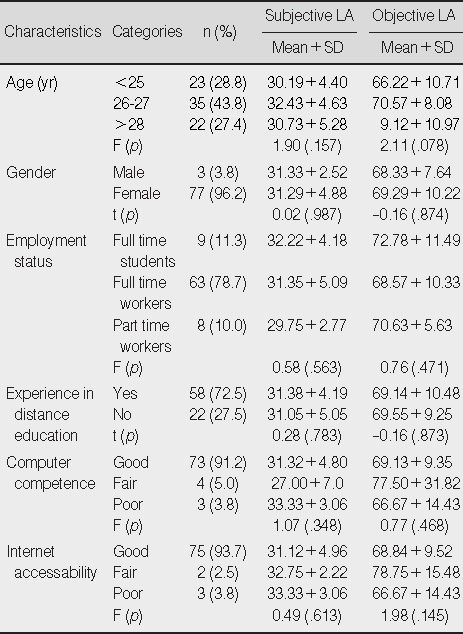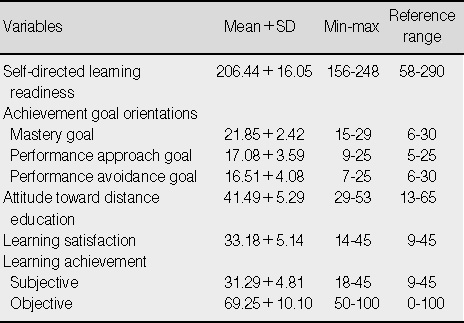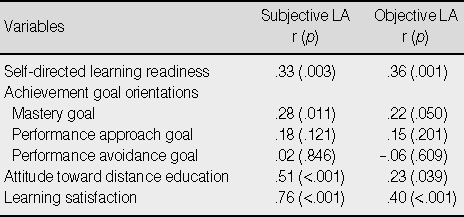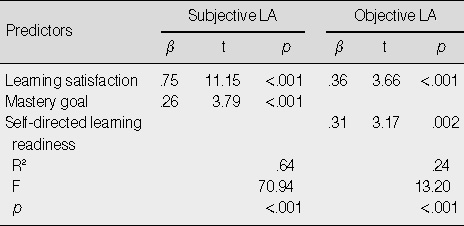Articles
- Page Path
- HOME > J Korean Acad Nurs > Volume 40(2); 2010 > Article
-
Original Article
- Factors Influencing Learning Achievement of Nursing Students in E-learning
- Jin-Hee Park, Eunha Lee, Sun Hyoung Bae
-
Journal of Korean Academy of Nursing 2010;40(2):182-190.
DOI: https://doi.org/10.4040/jkan.2010.40.2.182
Published online: April 30, 2010
1Assistant Professor, College of Nursing, Ajou University, Suwon, Korea.
2Doctoral Student, College of Nursing, Ajou University, Suwon, Korea.
3Doctoral Student, College of Nursing, Yonsei University, Seoul, Korea.
- Address reprint requests to: Bae, Sun Hyoung. College of Nursing, Yonsei University, Sinchon-dong, Seodaemun-gu, Seoul 120-752, Korea. Tel: 82-31-219-7019, Fax: 82-31-219-7020, baega7695@hanmail.net
Copyright © 2010 Korean Society of Nursing Science
Abstract
-
Purpose
- This study was done to identify self-directed learning readiness, achievement goal orientations, learning satisfaction and learning achievement, and to evaluate the factors affecting learning achievement for nursing students using a web-based Health Assessment e-Book.
-
Methods
- The research design was a cross-sectional study with a structured questionnaire and data were collected before using the web-based Health Assessment e-Book and 1 week after finishing. The participants were 80 nursing students who were taking the Health Assessment class from March to June 2009.
-
Results
- Mean score for subjective learning achievement was 31.26 and for objective learning achievement, 69.25. Subjective and objective learning achievement were positively correlated with self-directed learning readiness, mastery goal, attitude toward distance education, and learning satisfaction. In subjective learning achievement, learning satisfaction and mastery goal were significant predictive factors and explained 64% of the variance. Objective learning achievement was significantly predicted by learning satisfaction and self-directed learning readiness, which explained 24% of the variance.
-
Conclusion
- Learning satisfaction, mastery goal and self-directed learning readiness were found to be very important factors associated with learning achievement for nursing students using a web-based Health Assessment e-Book. To provide high quality and effective web-based courses and to improve nursing students' learning achievement and learning satisfaction, educators should consider the learner's characteristics from the initial stages of lecture planning.
This study was financially supported by the research fund of Ajou University Medical Center in 2008.
- 1. Adams A, Timmins F. Students views of integrating web-based learning technology into the nursing curriculum-A descriptive survey. Nurse Education in Practices. 2006;6:12–21.Article
- 2. Ary D, Jacobs LC, Razavieh A. Introduction to research in education. 2002;6th ed. Belmont, CA, Wadsworth Thompson Learning.
- 3. Cho SW, Kim AY. The relationships between goal orientations, the use of self-regulated learning strategies and self-efficacy of elementary school children. Ewha Journal of Educational Research. 1998;27:71–88.
- 4. Cook DA. The research we still are not doing: An agenda for the study of computer-based learning. Academic Medicine. 2005;80:541–548.ArticlePubMed
- 5. Cook DA. Web-based learning: Prons, cons and controversies. Clinical Medicine. 2007;7:37–42.ArticlePMC
- 6. Cook DA, Gelula MH, Dupras DM, Schwartz A. Instructional methods and cognitive and learning styles in web-based learning: Report of two randomized trials. Medical education. 2007;41:897–905.ArticlePubMed
- 7. Guglielmino LM. Development of the self-directed learning readiness scale. 1977;Atherns, GA, USA, The University of Georgia. Unpublished doctoral dissertation.
- 8. Jeong BY. Analyses of learning achievement and satisfaction on demographic characteristics in cyber universities: A casestudy. The Journal of Educational Information and Media. 2004;10:127–150.
- 9. Kang SH. Educational technological approach for design of digital textbook: Focused on type and function. Journal of Educational Technology. 1999;14:1–22.
- 10. Keller JM. Development and use of the ARCS model of motivational design. Journal of Instructional Development. 1987;10(3):2–10.ArticlePDF
- 11. Kim HY. The effects of self directed learning readiness, personality types, and attribution styles on academic achievement in adult education. 1997;Daejeon, Chungnam National University. Unpublished doctoral dissertation.
- 12. Kim MY, Choi WS, Lee KN. A Study on the characters of leaners affecting the success of learning under e-learning circumstances for universities. Journal of Korean Technology Education Association. 2007;8:221–236.
- 13. Kim SH. Relations among learner's personality types, self-direction, attitudes and self-efficacy toward technology, and achievement in cyber university. 2007;Seoul, Ewha Womans University. Unpublished doctoral dissertation.
- 14. Knowles MS. Self-directed learning: A guide for learners and teachers. 1975;Englewood Cliffs, NJ, Prentice-Hall/Cambridge.
- 15. Ko IS, Kang KS, Shin JO, Park JH, Yook SY, Yun SY. Development and evaluation of a vital signs e-book for undergraduate student nurses. Journal of Korean Academy of Nursing. 2005;35:1036–1043.ArticlePubMedPDF
- 16. Ko IS, Park JH, Kang KS, Yook SY, Song IJ, Cho SA, et al. Development and evaluation of the web-based wound care course for undergraduate nursing students. Journal of Korean Academy of Nursing. 2006;36:1324–1330.ArticlePubMedPDF
- 17. Kwack BS, Lee TW, Kang SH, Choi SH. The method of the development of e-book. 1998;Seoul, Korean Textbook Research Foundation.
- 18. Lee HY. Study on the relationships among achievement goal orientation, self-efficacy, attitude toward distance education, self-regulated learning strategies, achievement, participation, satisfaction in distance education. 2005;Seoul, Ewha Womans University. Unpublished master's thesis.
- 19. Lee YH. Investigating the relationships among goal orientation, self-regulated learning strategies and academic achievement in online inquiry-based learning. 2003;Seoul, Ewha Womans University. Unpublished master's thesis.
- 20. Meece JL, Blumenfel PC, Hoyle RH. Students' goal orientations and cognitive engagement in classroom activities. Journal of Educational Psychology. 1988;80:514–523.Article
- 21. Midgley C, Kaplan A, Middleton M, Maehr M, Urdan T, Anderman L, et al. The development and validation of scales assessing students achievement goal orientations. Contemporary Educational Psychology. 1998;23:113–131.ArticlePubMed
- 22. New educational paradigm: Development of e-learning system. Ministry of Education and Human Resources Development. 2004;09 15 Retrieved November 23, 2009. from http://ko.wikipedia.org/wiki/%EC%A0%84%EC%9E%90_%ED%95%99%EC%8A%B5.
- 23. Moore MG, Kearsley G. Distance education: A systems view. 1996;Belmont, CA, Wadsworth Publishing Company.
- 24. Pachnowski L, Jurczyk J. Correlating self-directed learning with distance learning success. Paper presented to the Annual Conference of the Eastern Educational Research Association. 2000;02;Clearwater, FL.
- 25. Park HJ. Relationship between e-learning effectiveness and its related factors in college education. 2008;Deagu, Keimyung University. Unpublished doctoral dissertation.
- 26. Park HJ, Choi MS. Relationships between e-learning effectiveness and its related factors in higher education. Journal of Educational Technology. 2008;24:27–53.Article
- 27. Pintrich PR. Multiple goals, multiple pathways: The role of goal orientation in learning and achievement. Journal of Educational Psychology. 2000;92:544–555.Article
- 28. Roh SZ. Factors influencing the academic achievements of web-based distance Learners-the case of capital region's undergraduate distance learners-. The Journal of Educational Information and Media. 2007;13:99–130.
- 29. Rovai AP, Wighting MJ, Baker JD, Grooms LD. Development of an instrument to measure perceived cognitive, affective, and psychomotor learning in traditional and virtual classroom higher education settings. Internet and Higher Education. 2009;12:7–13.Article
- 30. Zsohar H, Smith JA. Transition from the classroom to the web: Successful strategies for teaching online. Nursing Education Perspectives. 2008;29:23–28.PubMed
REFERENCES
Figure & Data
REFERENCES
Citations

- Exploring the effectiveness of different “escape room simulation teaching” methods on clinical preceptors’ knowledge and skills in judging and handling violent situations in the healthcare profession
Huang-Chin Wu, Han-Jen Hsu, Yi-Ting Chou, Chun-Ju Lin, Chun-Hong Shen, Ruey Chen
Interactive Learning Environments.2025; 33(8): 4932. CrossRef - The effectiveness of 3D cadaver simulation learning on the perceived learning achievement, satisfaction, and flow state of nursing students
Hyeongyeong Yoon
Clinical Simulation in Nursing.2024; 97: 101645. CrossRef - The influence of self-directed learning ability and self-leadership on the learning satisfaction and academic achievement of nursing students who experienced blended learning
Sungjun Kim, Ji Young Lim, Hwasoon Kim, Kyoung Ja Kim
The Journal of Korean Academic Society of Nursing Education.2024; 30(3): 232. CrossRef - A study on the factors influencing users’ willingness to continue using online learning platforms
Junren Ming, Qiuyu Zhu, Yu Cheng, Ruide Tu, Rong Chen
Procedia Computer Science.2024; 242: 492. CrossRef - Students’ learning preferences for forms and activities – suggestions for academic teachers
Hubert Wojciechowski, Łukasz Hadaś, Roman Domański
Przegląd Organizacji.2023; : 416. CrossRef - HOW ATTITUDES TOWARDS E-LEARNING AFFECTED THE ACADEMIC ACHIEVEMENT DURING THE COVID-19 PANDEMIC: AN EXAMPLE OF A NURSING SKILLS TEACHING
Oznur GURLEK KISACIK, Munevver SONMEZ, Azize OZDAS
Turkish Online Journal of Distance Education.2023; 24(1): 129. CrossRef - The Relationship Between Attitudes of Nursing Students Towards Web-Based Learning and their Readiness for Online Learning
İlkay ÇULHA
Artuklu International Journal of Health Sciences.2023; 3(3): 253. CrossRef - The effects of collaborative reasoning strategies on improving primary school students’ argumentative decision-making skills
Mohsen Bayat, Seyyed Kazem Banihashem, Omid Noroozi
The Journal of Educational Research.2022; 115(6): 349. CrossRef - Academic Success of Online Learning in Undergraduate Nursing Education Programs in the COVID-19 Pandemic Era
Sunmi Kim, Seok Hee Jeong, Hee Sun Kim, Young Ju Jeong
Journal of Professional Nursing.2022; 38: 6. CrossRef - Self-Directed Learning versus Problem-Based Learning in Korean Nurse Education: A Quasi-Experimental Study
Jaehee Jeon, Sihyun Park
Healthcare.2021; 9(12): 1763. CrossRef - Factors Affecting the Academic Achievement of Nursing College Students in a Flipped Learning Simulation Practice
Minkyung Gu, Sohyune Sok
International Journal of Environmental Research and Public Health.2021; 18(11): 5970. CrossRef - The Effect of Self-directed Learning Strategies on e-Learning Pre-learning of Nursing Students: Focusing on the Flow Experience
Ju Young Park
Journal of Korean Academy of Fundamentals of Nursing.2020; 27(1): 52. CrossRef - Effects of Flipped Learning on the Critical Thinking Disposition, Academic Achievement and Academic Self-efficacy of Nursing Students: A Mixed Methods Study
Ju Cha, Jin Kim
Journal of Korean Academic Society of Nursing Education.2020; 26(1): 25. CrossRef - Factors Affecting Students’ Preferences for Online and Blended Learning:
Motivational vs. Cognitive
Sinan Keskin, Halil Yurdugül
European Journal of Open, Distance and E-Learning.2020; 22(2): 72. CrossRef - Measuring Teachers-As-Learners’ Digital Skills and Readiness to Study Online for Successful e-Learning Experience
Evija Mirķe, Sarma Cakula, Lilian Tzivian
Journal of Teacher Education for Sustainability.2019; 21(2): 5. CrossRef - Differences in Non‐Cognitive Factors Influencing the Academic Achievement of Medical and Nursing Students: Focusing on Achievement Goal Orientation and Self‐Regulated Learning
Eun A Park, Kyung Hee Chun
Korean Medical Education Review.2014; 16(1): 32. CrossRef - Academic Achievement, Self-directed Learning, and Critical Thinking Disposition According to Learning Styles of Nursing Students
Sun-Hee Yang, Eun-Ho Ha, Og-Cheol Lee, In-Ok Sim, Young-Mi Park, Hyun-A Nam, Jeong-Sook Kim
Journal of Korean Academy of Fundamentals of Nursing.2012; 19(3): 334. CrossRef - Development and Effects of an e-Learning Program in Operating Room Nursing for Nursing Students
Eun Hee Park, Seon Young Hwang
Journal of Korean Academy of Nursing.2011; 41(1): 36. CrossRef - Factors Influencing Problem Solving Abilities of Freshmen Nursing Students
Yun Min Kim
Journal of Korean Academy of Nursing Administration.2010; 16(2): 190. CrossRef
Differences in Learning Achievement by General Characteristics (N=80)
LA=learning achievement.
Descriptive Statistics of Study Variables (N=80)
Correlation among Study Variables (N=80)
LA=learning achievement.
Factors Influencing Learning Achievement (N=80)
LA=learning achievement.
LA=learning achievement.
LA=learning achievement.
LA=learning achievement.
 KSNS
KSNS
 E-SUBMISSION
E-SUBMISSION




 Cite
Cite

